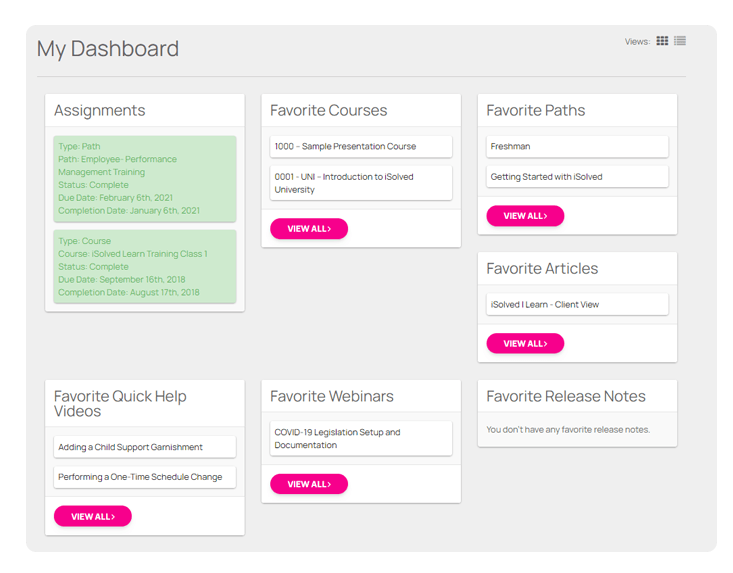
"To plant a garden is to believe in tomorrow." --Audrey Hepburn
Isn't it incredible that a packet of seeds can grow into a backyard full of vegetables, flowers, and herbs? If you've ever taken up gardening, you know how exciting it is to see little green sprouts peek out from the ground.
Every seed has the potential to grow, but it has to thrive under the right conditions. Are you watering it correctly? Is it getting the right amount of sun?
In the same way, your employees need the proper training to help them grow into their roles. If you don't foster their education and encourage them to continue learning, you could end up with a frustrated, stagnant team.
At Whirks, we implemented a Learning Management System (LMS) to help our team feel confident in their job responsibilities. We make training a priority for new hires but also encourage and require our current employees to utilize our library to continue growing in their roles.
Let's dive into what an LMS is and if it's a viable option for you and your industry. At the end of this article, you'll know if these features are the right fit for you, your mission, and your team.
What is an LMS?
A Learning Management System (LMS) is a software program that helps companies manage how their employees gain access to training. It can be integrated into your Human Capital Management (HCM) system by your payroll or HCM provider or a standalone product for training.
Depending on how you set up your training program and what learning opportunities you want to offer, you can choose from a wide range of options.
Some companies require employees to take compliance training, especially for heavily regulated industries like finance, health care, and manufacturing.
Other companies focus their training on topics that pertain to the needs of their organization. For example, a gym could implement an LMS that provides first aid certification or a customer service guide.
Videos and supporting documents are essential tools for training, but how do you keep your employees focused and engaged? The answer is gamification.
Gamification allows you to create games around challenging topics, helping your learners stay interested so they can absorb more information. A robust LMS system will allow you to gamify and award prizes and badges to employees as they complete their courses.
What are the core features of an LMS?
As you think about whether or not an LMS is right for you, it's helpful to understand some core features and how your organization will utilize them.
Dashboard
The dashboard is the first thing you and your team will see upon logging into the system. It serves as the home page and should be intuitive and user-friendly. It will include notifications, requirements, and their current courses.
It also allows you to offer digital or printable certificates when your employee completes a course - a very attractive feature for today's modern workforce.
An LMS can also include advanced elements, such as gamification, forums, and help requests. If the LMS you want contains these components, make sure you can access them from the main dashboard.

Course Catalog
A course catalog allows employees to look at what training opportunities are available to them and learn more about each one.
An LMS should include a detailed catalog with all available learning content, where administrators and supervisors can assign courses to their team members. A single course may include multiple learning elements:
- Powerpoint presentations
- Videos
- Games
- Quizzes
- A syllabus
Bundling the courses into learning paths helps you assign them to certain employees. For example, you can build a path for customer service reps who need to take courses focused on customer interaction, support, and communication.
State-Mandated Training Requirements
Many states and cities require specific training courses for employees. For example, both California and New York require anti-harassment training for employees.
The LMS you select should support your state-mandated training requirements. This saves you the time from building these courses and helps you relax about compliance.
Engaging Elements
Learning and training are only beneficial if your employees listen and retain the information. Ignoring the content or tuning out the videos results in a waste of time for you and your team.
An LMS helps you create engaging courses that your employees will enjoy and retain. Many modern LMS options include gamification, quizzes, and other fun features like badges to help gauge participation, competency, and completion. They will also include dashboards for the administrator that show how long an employee watched a course if they passed the quiz and more content engagement analytics.
Earning a badge and encouraging some friendly competition motivates your team to complete their courses and receive rewards.
Custom Course Creation
The ability to create catered custom courses is arguably the best element of an LMS. Your company has unique needs - whether that's rolling out training for a new organizational policy or outlining a new process, you can quickly provide employees with new courses to complete.
Uploading your own content and designing customized courses will benefit your company's training and the employees who utilize it. These courses don't have to be professionally produced, it can consist of a leader shoots a video on their phone or screen sharing as they walk through a technical product your team needs to use.
These custom videos can be uploaded into your LMS by anyone in your organization which makes it easy to maintain and update your course content.
What does an LMS look like for your business?
If you're in the home health care industry, your employees are required to continue their education. Offering courses on HIPAA or patient safety ensures that your team is well-trained and compliant.
Professional services such as law offices or accounting firms also benefit from an LMS. You can create courses around software and core company values that help foster a cohesive office environment. You can create courses on standard operating procedures, updates on technology, or even cover your handbook and policies for new employee onboarding.
Manufacturers and blue-collar industries can offer safety courses and lessons around OSHA compliance. This helps you keep your workers safe while also streamlining and scheduling regular training.
Any business can utilize an LMS. Whether you're a SaaS company training your sales department, or a veterinarian requiring new hires to watch videos on clinic procedures, an LMS is a tool that ensures your team is confident, compliant, and educated for their role in your company.
An LMS helps your team keep growing.
As Audrey said, "to grow a garden is to believe in tomorrow." Providing education and training for your team is believing in the future of their success - and your company's.
You water your garden so your plants will grow. In the same way, a strong training program boosts job satisfaction, morale, and efficiency. It encourages employees to grow into their roles and shows them that you're invested in their futures.
Although an LMS can be utilized by any industry, it may not be worth the time or additional cost for you and your company. If you already have an efficient training program in place or you're a small business with a tight-knit team, it doesn't make sense to pay extra for a feature you don't need.
If you are interested in integrating an LMS into your system, you're off to a great start. You know the features you need and how they benefit your team. It engages your employees, ensures compliance, and fosters a healthy work culture.
A garden doesn't grow overnight. But if you take time to tend it, you'll have thriving and happy plants that blossom into their full potential.
Topics: